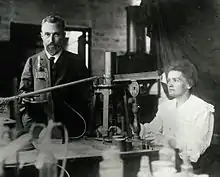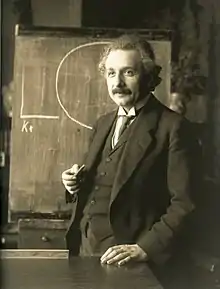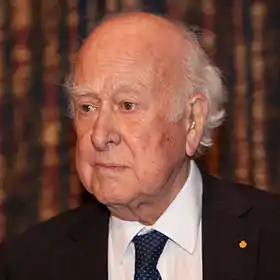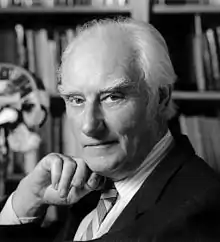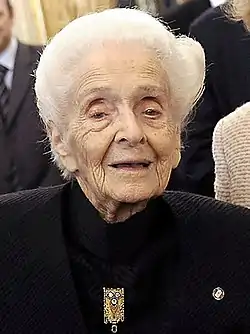قائمة اللادينيين الحاصلين على جائزة نوبل
تضم هذه القائمة الحائزين على جائزة نوبل الذين يعتبرون من الملحدون، اللاأدريون ، المفكرون الأحرار أو اللادينيون أو الذين عرفوا عن أنفسهم بذلك في فترة ما من حياتهم.[2] حسب إحدى الإحصائيات تشير أن جميع اللادينيون حصلوا على حوالي 10.5% من مجمل جوائر نوبل بين عام 1901 وعام 2000،[3] وحوالي 35% من مجمل الحائزين على جائزة نوبل في الأدب.[4] ووفقاً لنفس الإحصائيات قد فاز من الملحدون، واللاأدريون، والمفكرون الأحرار على حوالي 8.9% من مجمل الجوائز في مجال الطب، وحوالي 7.1% في مجال الكيمياء، وحوالي 5.2% في مجال الاقتصاد، وحوالي 4.7% في مجال الفيزياء، وحوالي 3.6% في مجال السلام.[4] ولقد كان ألفريد نوبل نفسه ملحد في فترة ما من حياته.[5] وجدت دراسة أخرى قامت بها جامعة نبراسكا- لينكون عام 1998 أنَ حوالي 16% من الحاصلين على جائزة نوبل في الفيزياء هم من خلفيَّة لادينية (بين الأعوام 1901-1990).[6]
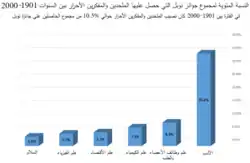
الكيمياء
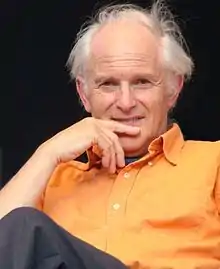
- سفانت أرهنيوس[7]
- بول بوير[8]
- فردريك جوليو-كوري[9]
- إيرين جوليو-كوري[10]
- ريتشارد إرنست[11]
- هيربرت هاوبتمان[12]
- رولد هوفمان [13]
- هارولد كروتو[14]
- جان ماري لين[15]
- بيتر ميتشل [16]
- جورج أولاه[17]
- فيلهلم أوستفالد[18]
- لينوس باولنغ[19]:336[20]
- ماكس بيروتس[21][22]
- فردريك سانغر[23]
- مايكل سميث[24]
- هارولد يوري[25]
الأدب
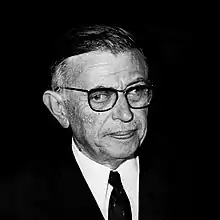
- صمويل بيكيت (1969)[30]
- بيورنستيارنه بيورنسون (1913)[31]
- بيرل باك (1938)[32]:58
- ألبير كامو[33]
- أناتول فرانس[34]
- جون غلزورثي (1932)[35]
- داريو فو[36]
- نادين غورديمير[37]
- جاو كسينغجيان[38]
- بابلو نيرودا[39]
- أوجين أونيل[32]:125[40]
- بيرتراند راسل[19]:27
- جورج برنارد شو[32]:125
- جان بول سارتر[41]
- وولي سوينكا.[42][43]
- جون ستاينبيك[44][45]
- جوزيه ساراماغو[46]
السلام
الفيزياء
- زوريس ألفيروف[53][54]
- هانز ألففين[55][56]
- فيليب أندرسون[2][57]
- جون باردين[2]
- هانز بيته[2][58]
- باتريك بلاكيت[59]
- نيكولاس بلومبرجن[11]
- نيلز بور[2][60][61][62]
- بيرسي ويليامز بريجمان[63][64][65]
- لويس دي بروي[2]
- جيمس تشادويك[66]
- سابرامانين تشاندراسخار[2][67]
- ماري كوري[2]
- بيار كوري[2]
- بول ديراك[2][19]:325[68]
- ألبرت أنيشتاين[2][69]
- إنريكو فيرمي[2]
- ريتشارد فاينمان[2][19]:328[70]
- فال فيتش[71]
- جيمس فرانك[72]
- دنيس غابور[73][74]
- موري جيلمان[75]
- فيتالي غينزبورغ[76]
- روي ج. غلاوبر[11]
- بيتر هيغز[77]
- جيرارت هوفت[78][79]
- هربرت كرومر[80]
- ليف لانداو[2][81]
- ليون ليدرمان[82][83]
- ألبرت ميكلسون[84]
- كونستانتين نوفوسيلوف[85]
- جن بيرين[86]
- أيزيدور اسحق رابي[2]
- تشاندراسيخارا رامان[2]
- ويليام شوكلي[2][19]:339
- إرفين شرودنغر[2][87][88]
- جاك شتاينبرجر[89][90]
- إيجور تام[91][92]
- يوهانس ديديريك فان دير فالس[2]
- يوجين ويغنر[2]
- ستيفن واينبرج[2][19]:342[93]
- تشين يانج[94]
علم وظائف الأعضاء أو الطب
- يوليوس أكسلرود[19]:322[95]
- روبرت باراني (1914)[96]
- جون مايكل بيشوب[97]
- فرنسيس كريك[98][99][100][101][102]
- ماكس دلبروك[103][104]
- كريستيان دو دوف[105]
- هوارد فلوري[106]
- كاميلو غولجي[107]
- فريدريك هوبكنس[108]
- أندرو هكسلي[109]
- فرنسوا جاكوب[110]
- بيتر مدور[111]
- جاك مونو[112]
- توماس مورغان [113]
- هربرت مولر[114]
- إيليا ميتشنيكوف[115]
- ريتا ليفي مونتالشيني[116]
- هرمان مولر[19]:334
- بول نرس[117]
- إيفان بافلوف[118]
- ريتشارد روبرتس [119]
- جون سالستون[120][121]
- ألبرت ناجيرابولت[122]
- نيكولاس تينبرغن[123]
- جيمس واتسون[124]
انظر أيضاً
المراجع
- Shalev 2003، صفحة 59
- Kimball, John (2015). Physics Curiosities, Oddities, and Novelties. CRC Press. صفحة 323. ISBN 978-1-4665-7636-0. الوسيط
|CitationClass=تم تجاهله (مساعدة) - "Distribution of Nobel Prizes by religion between 1901-2000, the data tooks from Baruch A. Shalev, 100 Years of Nobel Prizes (2003), Atlantic Publishers & Distributors, p.59 and p.57: between 1901 and 2000 reveals that 654 Laureates belong to 28 different religion. Most 65.4% have identified Christianity in its various forms as their religious preference. Overall, Christians have won a total of 78.3% of all the Nobel Prizes in Peace, 72.5% in Chemistry, 65.3% in Physics, 62% in Medicine, 54% in Economics and 49.5% of all Literature awards. While separating Roman Catholic from Protestants among Christians proved difficult in some cases, available information suggests that more Protestants were involved in the scientific categories and more Catholics were involved in the Literature and Peace categories. Atheists, agnostics, and freethinkers comprise 10.5% of total Nobel Prize winners; but in the category of Literature, these preferences rise sharply to about 35%". Shalev 2003، صفحة 57
- Shalev, Baruch Aba (2003). "Religion of Nobel prize winners". 100 years of Nobel prizes. New Delhi: Atlantic Publishers & Distributors. صفحات 57–59. ISBN 9788126902781. الوسيط
|CitationClass=تم تجاهله (مساعدة) - Evlanoff, Michael; Fluor, Marjorie (1969). Alfred Nobel: The Loneliest Millionaire. W. Ritchie Press. صفحة 88. الوسيط
|CitationClass=تم تجاهله (مساعدة)صيانة CS1: التاريخ والسنة (link) - Nobel prize winners in physics from 1901 to 1990 نسخة محفوظة 01 ديسمبر 2017 على موقع واي باك مشين.
- Stein, Gordon, المحرر (1985). The Encyclopedia of unbelief. 1 (الطبعة Nachdr.). Buffalo, N.Y.: Prometheus Books. صفحة 594. ISBN 978-0-87975-307-8.
Svante Arrhenius (I859-I927), recipient of the Nobel Prize in chemistry (I903), was a declared atheist...
الوسيط|CitationClass=تم تجاهله (مساعدة) - Boyer, Paul D. (March 2004), "A Path to Atheism", Freethought Today, Freedom From Religion Foundation, 21, مؤرشف من الأصل في 12 يونيو 2018, اطلع عليه بتاريخ 16 مارس 2010 الوسيط
|CitationClass=تم تجاهله (مساعدة); الوسيط|separator=تم تجاهله (مساعدة)CS1 maint: ref=harv (link) - Perrin, Francis (2008). "Joliot, Frédéric". Complete Dictionary of Scientific Biography. 7. Detroit: Charles Scribner's Sons. صفحة 151.
Raised in a completely nonreligious family, Joliot never attended any church and was a thoroughgoing atheist all his life.
الوسيط|CitationClass=تم تجاهله (مساعدة) - Perrin, Francis (2008). "Joliot-Curie, Irène". Complete Dictionary of Scientific Biography. 7. Detroit: Charles Scribner's Sons. صفحة 157. مؤرشف من الأصل في 1 يوليو 2016. اطلع عليه بتاريخ 16 أكتوبر 2015.
It was to her grandfather, a convinced freethinker, that Irène owed her atheism, later politically expressed as anticlericalism.
الوسيط|CitationClass=تم تجاهله (مساعدة) - JPararajasingham. "50 Renowned Academics Speaking About God (Part I)". YouTube. مؤرشف من الأصل في 12 أغسطس 2019. اطلع عليه بتاريخ 16 فبراير 2016. الوسيط
|CitationClass=تم تجاهله (مساعدة) - "Herbert Hauptman". The Telegraph. 27 Oct 2011. مؤرشف من الأصل في 15 نوفمبر 2018. اطلع عليه بتاريخ 15 أكتوبر 2015.
Outside the field of scientific research, he was known for his outspoken atheism: belief in God, he once declared, is not only incompatible with good science, but is "damaging to the wellbeing of the human race."
الوسيط|CitationClass=تم تجاهله (مساعدة) - Cardellini, Liberato (October 2007). "Looking for Connections: An Interview with Roald Hoffmann" (PDF). Journal of Chemical Education. 84 (10): 1631–1635. doi:10.1021/ed084p1631. مؤرشف من الأصل (pdf) في 20 أكتوبر 2016. اطلع عليه بتاريخ 15 أكتوبر 2015.
atheist who is moved by religion.
الوسيط|CitationClass=تم تجاهله (مساعدة) - Harold W. Kroto (1996). "Harold Kroto – Autobiography". Nobelprize.org, The Official Web Site of the جائزة نوبل. مؤرشف من الأصل في 7 يونيو 2013. اطلع عليه بتاريخ 24 مارس 2012.
I am a devout atheist – nothing else makes any sense to me and I must admit to being bewildered by those, who in the face of what appears so obvious, still believe in a mystical creator.
الوسيط|CitationClass=تم تجاهله (مساعدة) - Masood, Ehsan (22 July 2006). "Islam's reformers". Prospect. مؤرشف من الأصل في 26 ديسمبر 2018. اطلع عليه بتاريخ 15 أكتوبر 2015.
It is a scene I won’t forget in a hurry: Jean-Marie Lehn, French winner of the Nobel prize in chemistry, defending his atheism at a packed public conference at the new Alexandria Library in Egypt
الوسيط|CitationClass=تم تجاهله (مساعدة) - "Peter Mitchell – Biographical". The Nobel Prize in Chemistry 1978. Nobelprize.org. مؤرشف من الأصل في 4 سبتمبر 2008. اطلع عليه بتاريخ 15 أكتوبر 2015. الوسيط
|CitationClass=تم تجاهله (مساعدة) - "Today, I consider myself, in Thomas Huxley's terms, an agnostic. I don’t know whether there is a God or creator, or whatever we may call a higher intelligence or being. I don’t know whether there is an ultimate reason for our being or whether there is anything beyond material phenomena. I may doubt these things as a scientist, as we cannot prove them scientifically, but at the same time we also cannot falsify (disprove) them. For the same reasons, I cannot deny God with certainty, which would make me an atheist. This is a conclusion reached by many scientists." George Olah, A Life of Magic Chemistry
- Kocka, edited by Jürgen (2010). Work in a Modern Society the German Experience in European-American Perspective. New York: Berghahn Books, Inc. صفحة 45. ISBN 978-1-84545-797-6. الوسيط
|CitationClass=تم تجاهله (مساعدة)صيانة CS1: نص إضافي: قائمة المؤلفون (link) - Pafumi, G. R. Is Our Vision of God Obsolete?: Often What We Believe Is Not What We Observe. 2010: Xlibris Corporation. ISBN 978-1-4500-0396-4. الوسيط
|CitationClass=تم تجاهله (مساعدة)CS1 maint: location (link) - Pauling, Linus; Ikeda, Daisaku; Gage, Richard L. (1992). In quest of peace and the century of life : a dialogue between Linus Pauling and Daisaku Keda. Boston: Jones and Bartlett Publishers. صفحات 21–22. ISBN 978-0-86720-278-6. الوسيط
|CitationClass=تم تجاهله (مساعدة) - "Max Perutz Interview 2". The Vega Science Trust. مؤرشف من الأصل في 16 فبراير 2018. اطلع عليه بتاريخ 19 يونيو 2013. الوسيط
|CitationClass=تم تجاهله (مساعدة) - "Perutz rubbishes Popper and Kuhn". TSL EDUCATION LTD. 28 November 1994. مؤرشف من الأصل في 4 يناير 2014. اطلع عليه بتاريخ 19 يونيو 2013.
Dr Perutz, said: "It is one thing for scientists to oppose creationism which is demonstrably false but quite another to make pronouncements which offend people's religious faith -- that is a form of tactlessness which merely brings science into disrepute. My view of religion and ethics is simple: even if we do not believe in God, we should try to live as though we did."
الوسيط|CitationClass=تم تجاهله (مساعدة) - Hargittai, István; Hargittai, Magdolna (2002). Candid science II: conversations with famous biomedical scientists (الطبعة Verschiedene Aufl.). London: Imperial College Press. صفحات 73–83. ISBN 1-86094-288-1. الوسيط
|CitationClass=تم تجاهله (مساعدة) - Smith, Michael (1993). "Michael Smith – Biographical". Nobelprize.org. مؤرشف من الأصل في 12 يونيو 2018. اطلع عليه بتاريخ 15 أكتوبر 2015.
My only prizes from the Sunday School were "for attendance", so I presume my atheism, which developed when I left home to attend university, although latent, was discernible.
الوسيط|CitationClass=تم تجاهله (مساعدة) - Wysong, Randy L. (1976). The creation-evolution controversy (الطبعة 7th print). Midlanding, Michigan: Inquiry Press. صفحة 75. ISBN 978-0-918112-02-6. الوسيط
|CitationClass=تم تجاهله (مساعدة) - Ebenstein, Lanny (2007). Milton Friedman a biography (الطبعة 1st). New York: Palgrave Macmillan. صفحة 9. ISBN 978-0-230-60345-5. الوسيط
|CitationClass=تم تجاهله (مساعدة) - Elzinga, Kenneth G.; Givens, Matthew R. (Spring 2009). "Christianity and Hayek". Faith & Economics (53): 53–68. الوسيط
|CitationClass=تم تجاهله (مساعدة) - Nasar, Sylvia (2012). A Beautiful Mind (الطبعة Reprint). Faber & Faber. صفحة 64. ISBN 978-0-571-26607-4. الوسيط
|CitationClass=تم تجاهله (مساعدة) - Palfrey, Judith S. (2006). Child health in America : making a difference through advocacy (الطبعة Online-Ausg.). Baltimore: Johns Hopkins University. صفحة 123. ISBN 978-0-8018-8453-5. الوسيط
|CitationClass=تم تجاهله (مساعدة)صيانة CS1: التاريخ والسنة (link) - Cronin, Anthony (1999). Samuel Beckett : the last modernist (الطبعة 1st Da Capo Press). New York: Da Capo Press. صفحة 90. ISBN 978-0-306-80898-2.
They were both agnostics, though both set a high associative value on the language in which the traditional religions of their forebears had been expressed, and in conversation and writing were not averse to ironic reference to certain metaphysical concepts.
الوسيط|CitationClass=تم تجاهله (مساعدة) - Paulson, Arthur C. (1930). "Bjørnson and the Norwegian-Americans, 1880–81". Studies and Records. Norwegian-American Historical Association. 5: 84–109. مؤرشف من الأصل في 5 مارس 2016. اطلع عليه بتاريخ 15 أكتوبر 2015. الوسيط
|CitationClass=تم تجاهله (مساعدة) - Barker, Dan (2011). The good atheist : living a purpose-filled life without God. Berkeley, CA: Ulysses Press. ISBN 978-1-56975-846-5. الوسيط
|CitationClass=تم تجاهله (مساعدة) - Maze, John Robert (2010). Albert Camus : plague and terror, priest and atheist. Bern: Peter Lang. ISBN 978-3-0343-0006-3. الوسيط
|CitationClass=تم تجاهله (مساعدة) - Collins, Joseph (Fall 2015). "Anatole France". VQR. 91 (4). مؤرشف من الأصل في 16 ديسمبر 2012. اطلع عليه بتاريخ 15 أكتوبر 2015. الوسيط
|CitationClass=تم تجاهله (مساعدة) - Ramesh Chopra (2005). Academic Dictionary Of Philosophy. Gyan Books. صفحة 142. ISBN 9788182052246.
His agnosticism is best seen in his 'Moods, Songs, and Doggerels'.
الوسيط|CitationClass=تم تجاهله (مساعدة) - Behan, Tom (2000). Dario Fo : revolutionary theatre. London: Pluto. صفحة 103. ISBN 978-0-7453-1362-7. الوسيط
|CitationClass=تم تجاهله (مساعدة)صيانة CS1: التاريخ والسنة (link) - Bazin, Nancy Topping, المحرر (1990). Conversationwith Nadine Gordimer. London: University Press of Mississippi. صفحة 151. ISBN 978-0-87805-445-9. الوسيط
|CitationClass=تم تجاهله (مساعدة) - Gao Xingjian (2000). "Nobel Lecture – Literature 2000". Nobelprize.org, The Official Web Site of the جائزة نوبل. مؤرشف من الأصل في 22 ديسمبر 2017. اطلع عليه بتاريخ 24 مارس 2012.
… I would like to say that despite my being an atheist I have always shown reverence for the unknowable.
الوسيط|CitationClass=تم تجاهله (مساعدة) - Feinstein, Adam (2008). Pablo neruda. Bloomsbury Publishing USA. صفحات 36, 38, 97. ISBN 978-1-59691-781-1. الوسيط
|CitationClass=تم تجاهله (مساعدة) - Diggins, John Patrick (2007). Eugene O'Neill's America desire under democracy. Chicago: University of Chicago Press. صفحة 130. ISBN 978-0-226-14882-3.
O'Neill, an agnostic and an anarchist, maintained little hope in religion or politics and saw institutions not serving to preserve liberty but standing in the way of the birth of true freedom.
الوسيط|CitationClass=تم تجاهله (مساعدة) - Sartre, Jean-Paul (1985). Existentialism and human emotions (الطبعة 1st Carol Pub. Group). New York: Philosophical Library. صفحة 15. ISBN 978-0-8065-0902-0. الوسيط
|CitationClass=تم تجاهله (مساعدة) - "Wole Soyinka". Academy of Archievement. Washington D.C. مؤرشف من الأصل في 13 نوفمبر 2016. اطلع عليه بتاريخ 20 ديسمبر 2013. الوسيط
|CitationClass=تم تجاهله (مساعدة) - Wole Soyinka (2007). Climate of Fear: The Quest for Dignity in a Dehumanized World. Random House LLC. صفحة 119. ISBN 978-0-307-43082-3.
I already had certain agnostic tendencies—which would later develop into outright atheistic convictions— so it was not that I believed in any kind of divine protection.
الوسيط|CitationClass=تم تجاهله (مساعدة) - Beegel, Susan F.; Shillinglaw, Susan; Tiffney, Jr., Wesley N. (2007). Steinbeck and the Environment Interdisciplinary Approaches. Tuscaloosa: University of Alabama Press. صفحة 159. ISBN 978-0-8173-5487-9. الوسيط
|CitationClass=تم تجاهله (مساعدة) - Benson, Jackson J. (1984). The true adventures of John Steinbeck, writer: a biography. Viking Press. صفحة 248. ISBN 978-0-670-16685-5.
Ricketts did not convert his friend to a religious point of view — Steinbeck remained an agnostic and, essentially, a materialist — but Ricketts's religious acceptance did tend to work on his friend, …
الوسيط|CitationClass=تم تجاهله (مساعدة) - Eberstadt, Fernanda (18 June 2010). "José Saramago, Nobel Prize-Winning Portuguese Writer, Dies at 87". The New York TImes. مؤرشف من الأصل في 26 ديسمبر 2018. اطلع عليه بتاريخ 15 أكتوبر 2015. الوسيط
|CitationClass=تم تجاهله (مساعدة) - Ceadel, Martin (2009). Living the great illusion : Sir Norman Angell, 1872–1967. Oxford: Oxford University Press. صفحة 22. ISBN 978-0-19-957116-1. الوسيط
|CitationClass=تم تجاهله (مساعدة)صيانة CS1: التاريخ والسنة (link) - "Gorbachev a closet Christian?". Chicago Tribune. 23 March 2008. مؤرشف من الأصل في 11 مايو 2008. اطلع عليه بتاريخ أكتوبر 2020. الوسيط
|CitationClass=تم تجاهله (مساعدة); تحقق من التاريخ في:|تاريخ الوصول=(مساعدة) - Gorelik, Gennady; Antonina W. Bouis (2005). The World of Andrei Sakharov: A Russian Physicist's Path to Freedom. Oxford University Press. صفحة 356. ISBN 978-0-19-515620-1.
Apparently Sakharov did not need to delve any deeper into it for a long time, remaining a totally nonmilitant atheist with an open heart.
الوسيط|CitationClass=تم تجاهله (مساعدة) - Gorelik, Gennadiĭ Efimovich; Antonina W. Bouis (2005). The World of Andrei Sakharov: A Russian Physicist's Path to Freedom. Oxford University Press. صفحة 158. ISBN 978-0-19-515620-1. مؤرشف من الأصل في 23 مارس 2020. اطلع عليه بتاريخ 27 مايو 2012.
Sakharov was not invited to this seminar. Like most of the physicists of his generation, he was an atheist.
الوسيط|CitationClass=تم تجاهله (مساعدة) - Todd K. Shackelford; Viviana A. Weekes-Shackelford, المحررون (2012). The Oxford Handbook of Evolutionary Perspectives on Violence, Homicide, and War. Oxford University Press. صفحة 465. ISBN 978-0-19-973840-3.
The Soviet dissident most responsible for defeating communism, Andrei Sakharov, was an atheist.
الوسيط|CitationClass=تم تجاهله (مساعدة) - Wiesel, Elie Wiesel (2010). And the sea is never full memoirs 1969- (الطبعة Unabridged). New York: Alfred Knopf. صفحة 318. ISBN 978-0-307-76409-6. الوسيط
|CitationClass=تم تجاهله (مساعدة) - "Prominent Russians: Zhores Alferov". RT.com. مؤرشف من الأصل في 12 مايو 2019. اطلع عليه بتاريخ 21 أبريل 2012.
In public life the scientist is a strong supporter of communism, an atheist strongly objecting to advancement of religious education in Russia, and proponent of science and knowledge as the means to see a better future.
الوسيط|CitationClass=تم تجاهله (مساعدة) - "Zhores I. Alferov". NNDB.com. مؤرشف من الأصل في 23 يناير 2019. اطلع عليه بتاريخ 21 أبريل 2012. الوسيط
|CitationClass=تم تجاهله (مساعدة) - "Nuclear power is uniquely unforgiving: as Swedish Nobel physicist Hannes Alfvén said, "No acts of God can be permitted."" Amory Lovins, Inside NOVA – Nuclear After Japan: Amory Lovins, pbs.org. نسخة محفوظة 05 نوفمبر 2013 على موقع واي باك مشين.
- Helge Kragh (2004). Matter and Spirit in the Universe: Scientific and Religious Preludes to Modern Cosmology. OECD Publishing. صفحة 252. ISBN 978-1-86094-469-7.
Alfven dismissed in his address religion as a "myth," and passionately criticized the big-bang theory for being dogmatic and violating basic standards of science, to be no less mythical than religion.
الوسيط|CitationClass=تم تجاهله (مساعدة) - Anderson, Philip W. (2011). More and different notes from a thoughtful curmudgeon. Singapore: World Scientific. صفحة 177. ISBN 9789814350143.
We atheists can . . . argue that, with the modern revolution in attitudes toward homosexuals, we have become the only group that may not reveal itself in normal social discourse.
الوسيط|CitationClass=تم تجاهله (مساعدة) - Brian, Dennis (2008). The Voice of Genius: Conversations with Nobel Scientists and Other Luminaries. Basic Books. صفحة 117. ISBN 978-0-465-01139-1. الوسيط
|CitationClass=تم تجاهله (مساعدة) - Nye, Mary Jo (2008). "Blackett, Patrick Maynard Stuart". In Gillispie, Charles Coulston (المحرر). Complete dictionary of scientific biography. 19. Detroit, Mich.: Charles Scribner's Sons. صفحة 293. ISBN 978-0-684-31559-1.
The grandson of a vicar on his father’s side, Blackett respected religious observances that were established social customs, but described himself as agnostic or atheist.
الوسيط|CitationClass=تم تجاهله (مساعدة) - Simmons, John (2000). "Niels Bohr and the atom 1885–1962". The scientific 100 : a ranking of the most influential scientists, past and present. New York, N.Y.: Kensington Pub. Corp. صفحة 16. ISBN 978-0-8065-2139-8.
His mother was warm and intelligent, and his father, as Bohr himself later recalled, recognized "that something was expected of me." The family was not at all devout, and Bohr became an atheist...
الوسيط|CitationClass=تم تجاهله (مساعدة)صيانة CS1: التاريخ والسنة (link) - Peterson, Richard (2010). "The Copenhagen spirit of science and birth of the nuclear atom". In Stewart, Melville Y. (المحرر). Science and religion in dialogue. Oxford: Wiley-Blackwell. صفحة 416. ISBN 978-1-4443-1736-7.
... after a youth of confirming faith Bohr himself was a non-believer.
الوسيط|CitationClass=تم تجاهله (مساعدة) - Favrholdt, David (1994). "Niels Bohr and realism". In Faye, Jan; Folse, Henry J. (المحررون). Niels Bohr and Contemporary Philosophy. Dordrecht: Springer Netherlands. صفحة 88. ISBN 9789401581066.
Planck was religious and had a firm belief in God; Bohr was not, but his objection to Planck's view had no anti-religious motive.
الوسيط|CitationClass=تم تجاهله (مساعدة)صيانة CS1: التاريخ والسنة (link) - "Percy Williams Bridgman". NNDB.com. مؤرشف من الأصل في 15 يناير 2019. اطلع عليه بتاريخ 24 أبريل 2012.
He was raised in the Congregational Church, but faith in God clashed with his well-known analytical nature and he told his family as a young man that he could not in good conscience become a church member.
الوسيط|CitationClass=تم تجاهله (مساعدة) - Maila L. Walter (1990). Science and Cultural Crisis: An Intellectual Biography of Percy Williams Bridgman (1882–1961). Stanford University Press. صفحات 14–15. ISBN 978-0-8047-1796-0.
Raymond Bridgman was extremely disappointed with his son's rejection of his religious views. Near the end of his life, however, he offered a conciliatory interpretation that allowed him to accept Percy's commitment to honesty and integrity as a moral equivalent to religion.
الوسيط|CitationClass=تم تجاهله (مساعدة) - Ray Monk (2013). Robert Oppenheimer: A Life Inside the Center. Random House LLC. ISBN 978-0-385-50413-3.
In many ways they were opposites; Kemble, the theorist, was a devout Christian, while Bridgman, the experimentalist, was a strident atheist.
الوسيط|CitationClass=تم تجاهله (مساعدة) - Brown, Andrew (1997). The neutron and the bomb : a biography of Sir James Chadwick (الطبعة 1st). Oxford: Oxford University Press. صفحة 362. ISBN 978-0-19-853992-6.
He was a lifelong atheist and felt no need to develop religious faith as he approached the end...
الوسيط|CitationClass=تم تجاهله (مساعدة) - Vishveshwara, C. V. (April 2000). "Leaves from an unwritten diary: S. Chandrasekhar, Reminiscences and Reflections" (PDF). Current Science. 78 (8): 1025–1033. مؤرشف من الأصل (PDF) في 4 مارس 2016. اطلع عليه بتاريخ 16 أكتوبر 2015.
In his later years, Chandra had openly admitted to being an atheist which also meant that he subscribed to no religion in the customary sense of the word.
الوسيط|CitationClass=تم تجاهله (مساعدة) - Heisenberg, Werner (1972). Physics and beyond : encounters and conversations (الطبعة 1st Harper Torchbook). New York: Harper & Row. ISBN 0-06-131622-9.
... Dirac said: "I cannot understand why we idle discussing religion. If we are honest — and as scientists honesty is our precise duty — we cannot help but admit that any religion is a pack of false statements, deprived of any real foundation. The very idea of God is a product of human imagination.[…] I do not recognize any religious myth, at least because they contradict one another.[…]" Pauli jokingly said: "Well, I'd say that also our friend Dirac has got a religion and the first commandment of this religion is: God does not exist and Paul Dirac is his prophet."
الوسيط|CitationClass=تم تجاهله (مساعدة) - Dukas, Helen; Hoffmann, Banesh, المحررون (1989). Albert Einstein, the human side : new glimpses from his archives. Princeton, NJ: Princeton Univ. Press. صفحة 43. ISBN 978-0-691-02368-7.
It was, of course, a lie what you read about my religious convictions, a lie which is being systematically repeated. I do not believe in a personal God and I have never denied this but have expressed it clearly. If something is in me which can be called religious then it is the unbounded admiration for the structure of the world so far as our science can reveal it.
الوسيط|CitationClass=تم تجاهله (مساعدة) - Feynman, Richard P. (2011). Leighton, Ralph (المحرر). "What Do You Care What Other People Think?": Further Adventures of a Curious Character. W. W. Norton & Company. صفحة 25. ISBN 978-0-393-07981-4.
The elders began getting nervous, because I was an avowed atheist by that time
الوسيط|CitationClass=تم تجاهله (مساعدة) - "Val Fitch". NNDB.com. مؤرشف من الأصل في 15 يناير 2019. اطلع عليه بتاريخ 18 يوليو 2012. الوسيط
|CitationClass=تم تجاهله (مساعدة) - Nachmansohn, David (1979). German-Jewish pioneers in science, 1900–1933. Berlin, Heidelberg: Springer. صفحة 62. ISBN 978-0-387-90402-3.
As he said, science was his God and nature his religion. He did not insist that his daughters attend religious instruction classes (Religionsunterricht) in school. But he was very proud of his Jewish heritage..
الوسيط|CitationClass=تم تجاهله (مساعدة)صيانة CS1: التاريخ والسنة (link) - Brigham Narins (2001). Notable Scientists from 1900 to the Present: D-H. Gale Group. صفحة 797. ISBN 978-0-7876-1753-0.
Although Gabor's family became Lutherans in 1918, religion appeared to play a minor role in his life. He maintained his church affiliation through his adult years but characterized himself as a "benevolent agnostic".
الوسيط|CitationClass=تم تجاهله (مساعدة) - "The family adopted the Lutheran faith in 1918, and although Gabor nominally remained true to it, religion appears to have had little influence in his life. He later acknowledged the role played by an antireligious humanist education in the development of his ideas and stated his position as being that of a “benevolent agnostic.”" "Gabor, Dennis." Complete Dictionary of Scientific Biography. 2008. Encyclopedia.com. (30 January 2012). نسخة محفوظة 11 يناير 2020 على موقع واي باك مشين.
- Wouk, Herman (2010). The language God talks on science and religion (الطبعة 1st). New York, NY: Little, Brown and Co. صفحة 17. ISBN 978-0-316-09675-1. الوسيط
|CitationClass=تم تجاهله (مساعدة)صيانة CS1: التاريخ والسنة (link) - Vitaly Ginzburg (2003). "Vitaly L. Ginzburg – Autobiography". Nobelprize.org, The Official Web Site of the جائزة نوبل. مؤرشف من الأصل في 21 مارس 2013. اطلع عليه بتاريخ 24 مارس 2012.
I am an atheist, that is, I think nothing exists except and beyond nature. Within the limits of my, undoubtedly insufficient knowledge of the history of philosophy, I do not see in fact any difference between atheism and the pantheism of Spinoza.
الوسيط|CitationClass=تم تجاهله (مساعدة) - Sample, Ian (17 November 2007). "The god of small things". London: The Guardian. مؤرشف من الأصل في 20 يونيو 2013. اطلع عليه بتاريخ 21 مارس 2013.
The name has stuck, but makes Higgs wince and raises the hackles of other theorists. "I wish he hadn't done it," he says. "I have to explain to people it was a joke. I'm an atheist, but I have an uneasy feeling that playing around with names like that could be unnecessarily offensive to people who are religious."
الوسيط|CitationClass=تم تجاهله (مساعدة) - "Gerardus `t Hooft – Science Video Interview". 2004. مؤرشف من الأصل في 17 ديسمبر 2018. اطلع عليه بتاريخ 25 أبريل 2012.
When asked by the interviewer about his view of the universe and the design or non-design of the universe, Hooft replied, "Well absolutely amazing fact that it seems that the entire universe is now in grasp of theoretical physics. It still highly premature to make theories that includes how the big bang originated as and things like that. Although, people are tying that every day. ...As far as I'm concerned, everything seems to behave completely rationally. The laws of physics is all we need to understand how the universe got into being. And then eventually we end up with this religious question as to why is the universe is the way it is and how can it be it is a place for humans to live in, that is a miracle. I don't have really any answers here, but as a physicist I've learn to appreciate the fact that everything seems to have totally rational explanations and as far as I'm concerned, I expect the entire universe now also to be something you can explain in completely rational terms. That what I expect now, just because of past experience."
الوسيط|CitationClass=تم تجاهله (مساعدة) - "Gerardus `t Hooft – Science Video Interview". 2004. مؤرشف من الأصل في 17 ديسمبر 2018. اطلع عليه بتاريخ 25 أبريل 2012.
When asked by the interviewer about his belief in an afterlife, Hooft replied, "Well, such beliefs I think I related to religions of the past and I don't think that notions such as 'afterlife' has any...scientific basis. Not in terms of modern science. So I can only say no."
الوسيط|CitationClass=تم تجاهله (مساعدة) - Kroemer, Herbert. "Herbert Kroemer – Science Video Interview". مؤرشف من الأصل في 17 ديسمبر 2018.
Interviewer: "You have no belief in a afterlife?" Kroemer: "That's correct." Interviewer: "...You don't see the evidence of a designer?" Kroemer: "No, I don't." Interviewer: "Could you say more about it?" Kroemer: "I think it's just wishful thinking."
الوسيط|CitationClass=تم تجاهله (مساعدة) - Schaefer, Henry F. (2008). Science and Christianity : conflict or coherence?. Athens, Ga.: University of Georgia. صفحة 9. ISBN 0-9742975-0-X.
I present here two examples of notable atheists. The first is Lev Landau, the most brilliant Soviet physicist of the twentieth century.
الوسيط|CitationClass=تم تجاهله (مساعدة) - Dan Falk (2005). "What About God?". Universe on a T-Shirt: The Quest for the Theory of Everything. Arcade Publishing. صفحة 195. ISBN 978-1-55970-733-6.
"Physics isn't a religion. If it were, we'd have a much easier time raising money." - Leon Lederman
الوسيط|CitationClass=تم تجاهله (مساعدة) - Babu Gogineni (July 10, 2012). "It's the Atheist Particle, actually". Postnoon News. مؤرشف من الأصل في 14 يوليو 2012. اطلع عليه بتاريخ 10 يوليو 2012.
Leon Lederman is himself an atheist and he regrets the term, and Peter Higgs who is an atheist too, has expressed his displeasure, but the damage has been done!
الوسيط|CitationClass=تم تجاهله (مساعدة) - Barrow, John D. (2000). The book of nothing : vacuums, voids, and the latest ideas about the origins of the universe (الطبعة 1st Vintage Books). New York: Vintage Books. صفحة 136. ISBN 978-0-375-72609-5. الوسيط
|CitationClass=تم تجاهله (مساعدة) - Eremoenko, Alexey (9 October 2014). "Q&A: Russian Nobel Laureate on Fun, God and the 'Ideal Physicist'". The Moscow Times. مؤرشف من الأصل في 24 نوفمبر 2015. اطلع عليه بتاريخ 16 فبراير 2016. الوسيط
|CitationClass=تم تجاهله (مساعدة) - Bernard Valeur, Jean-Claude Brochon (2001). New Trends in Fluorescence Spectroscopy: Applications to Chemical and Life Sciences. Springer. صفحة 17. ISBN 978-3-540-67779-6.
Jean and Francis Perrin held similar political and philosophical ideas. Both were socialists and atheists.
الوسيط|CitationClass=تم تجاهله (مساعدة)صيانة CS1: يستخدم وسيط المؤلفون (link) - Moore, Walter (1994). A life of Erwin Schrödinger. Cambridge: Cambridge Univ. Press. صفحة 86. ISBN 978-0-521-46934-0.
Schopenhauer often called himself an atheist, as did Schrodinger, and if Buddhism and Vedanta can be truly described as atheistic religions, both the philosopher and his scientific disciple were indeed atheists. They both rejected the idea of a "personal God" …
الوسيط|CitationClass=تم تجاهله (مساعدة)صيانة CS1: التاريخ والسنة (link) - Diem-Lane, Andrea (2008). Spooky Physics: Einstein vs. Bohr. MSAC Philosophy Group. صفحة 68. ISBN 978-1-56543-080-8.
In terms of religion, Schrodinger fits in the atheist camp. He even lost a marriage proposal to his love, Felicie Krauss, not only due to his social status but his lack of religious affiliation. He was known as a freethinker who did not believe in god.
الوسيط|CitationClass=تم تجاهله (مساعدة) - The International Academy of Humanism at the website of the Council for Secular Humanism. Retrieved 18 October 2007. Some of this information is also at the International Humanist and Ethical Union website نسخة محفوظة 07 نوفمبر 2017 على موقع واي باك مشين.
- Istva ́n Hargittai, Magdolna Hargittai (2006). Candid Science VI: More Conversations with Famous Scientists. Imperial College Press. صفحة 749. ISBN 978-1-86094-885-5.
Jack Steinberger: "I'm now a bit anti-Jewish since my last visit to the synagogue, but my atheism does not necessarily reject religion."
الوسيط|CitationClass=تم تجاهله (مساعدة) - Ginzburg, V. L. (2005). About Science, Myself and Others. CRC Press. صفحة 253. ISBN 978-0-7503-0992-9.
Nowadays, when we are facing manifestations of religious and. more often, pseudoreligious feelings, it is appropriate to mention that Igor Evgenevich was a convinced and unreserved atheist.
الوسيط|CitationClass=تم تجاهله (مساعدة) - Feinberg, E. L. & Leonidov, A. V. (2011). Physicists: Epoch and Personalities (الطبعة 2). World Scientific. صفحة 86. ISBN 9789812834164. الوسيط
|CitationClass=تم تجاهله (مساعدة) - Azpurua, Ana Elena (March 24, 2008). "In Search of the God Particle". Newsweek. صفحة 3. مؤرشف من الأصل في 27 أبريل 2009. اطلع عليه بتاريخ 25 مارس 2008.
I don't believe in God, but I don't make a religion out of not believing in God. I don't organize my life around that.
الوسيط|CitationClass=تم تجاهله (مساعدة) - Jesse Hong Xiong (2009). "Seven". The Outline of Parapsychology. Rowman & Littlefield. صفحة 322. ISBN 978-0-7618-4945-2.
When a reporter asked him: “Do you believe there is a Creator who creates all in the universe?" Professor Chen Ning Yang (1922- ), a Chinese Nobel Prize winner in physics in 1957, answered: “I think it is hard for me to directly say 'yes' or 'no'. I can only say that when we more and more understand the wonderful structures in the nature, no matter whether we directly or indirectly ask the question, there does exist the question you ask: is there someone or God who takes charge of all? I think it is a question that will never be finally answered. (The reporter asked: 'Is it because what man knows is too limited?') On one hand, yes; on the other hand, we can have a feeling that the universe will not be created so wonderful without an ultimate goal.” Professor Yang held agnosticism here.
الوسيط|CitationClass=تم تجاهله (مساعدة) - Craver, Carl F (2008). "Axelrod, Julius". Complete Dictionary of Scientific Biography. 19. Detroit: Charles Scribner's Sons. صفحة 122.
Although he became an atheist early in life and resented the strict upbringing of his parents’ religion, he identified with Jewish culture and joined several international fights against anti-Semitism.
الوسيط|CitationClass=تم تجاهله (مساعدة) - Robert W. Baloh. "Robert Bárány and the controversy surrounding his discovery of the caloric reaction". Neurology.org. مؤرشف من الأصل في 15 مارس 2016. اطلع عليه بتاريخ 14 مايو 2012.
Although anti-Semitism was again on the rise in Austria, it is unlikely that anti-Semitism was a factor in the hostility toward Bárány because he was an agnostic who did not believe in Zionism.
الوسيط|CitationClass=تم تجاهله (مساعدة) - "J. Michael Bishop". NNDB.com. مؤرشف من الأصل في 16 يوليو 2019. اطلع عليه بتاريخ 18 يوليو 2012. الوسيط
|CitationClass=تم تجاهله (مساعدة) - Crick, Francis (1988). What mad pursuit : a personal view of scientific discovery. New York: Basic Books. صفحة 10. ISBN 0-465-09138-5. الوسيط
|CitationClass=تم تجاهله (مساعدة)صيانة CS1: التاريخ والسنة (link) - Crick, Francis (3–5 February 1990). "How I Got Inclined Towards Atheism". Atheist Centre 1940–1990 Golden Jubilee International Conference Souvenir. Vijayawada, India: Positive Atheism. مؤرشف من الأصل في 24 مايو 2019. اطلع عليه بتاريخ 15 أكتوبر 2015. الوسيط
|CitationClass=تم تجاهله (مساعدة) - Steyn, Mark (October 2004). "The Twentieth-Century Darwin". ذا أتلانتيك. مؤرشف من الأصل في 9 يوليو 2008. اطلع عليه بتاريخ 14 أغسطس 2020. الوسيط
|CitationClass=تم تجاهله (مساعدة) - Siegel, Ralph M.; Callaway, Edward M. (2004). "Francis Crick's Legacy for Neuroscience: Between the α and the Ω". PLoS Biology. 2 (12): e419. doi:10.1371/journal.pbio.0020419. PMC 535570. PMID 17593891.
Francis Crick was an evangelical atheist.
الوسيط|CitationClass=تم تجاهله (مساعدة) - Highfield, Roger (20 Mar 2003). "Do our genes reveal the hand of God?". The Telegraph. مؤرشف من الأصل في 6 يناير 2019. اطلع عليه بتاريخ 15 أكتوبر 2015.
Crick, 86, said: "The god hypothesis is rather discredited."
الوسيط|CitationClass=تم تجاهله (مساعدة) - "Max Delbrück". NNDB.com. مؤرشف من الأصل في 29 يونيو 2019. اطلع عليه بتاريخ 14 مايو 2012. الوسيط
|CitationClass=تم تجاهله (مساعدة) - Walter Shropshire (2007). Max Delbrück and the New Perception of Biology, 1906–1981: A Centenary Celebration, University of Salamanca, October 9–10, 2006. AuthorHouse. صفحة 155. ISBN 978-1-4343-1435-2.
As far as I know, he never identified himself as a member of any formal church or religious faith, but neither did he reject religion. He had a deeply felt respect for all faiths, believing that regardless of the details, they all fill basically the same human aspirations.
الوسيط|CitationClass=تم تجاهله (مساعدة) - Ruse, Michael. "Life Evolving: Molecules, Mind, and Meaning by Christian de Duve (Introductory essay)". The International Society for Science and Religion library project. مؤرشف من الأصل في 16 مارس 2016. اطلع عليه بتاريخ 15 أكتوبر 2015. الوسيط
|CitationClass=تم تجاهله (مساعدة) - Trevor Illtyd Williams (1984). Howard Florey, Penicillin and After. Oxford University Press. صفحة 363. ISBN 978-0-19-858173-4.
As an agnostic, the chapel services meant nothing to Florey but, unlike some contemporary scientists, he was not aggressive in his disbelief.
الوسيط|CitationClass=تم تجاهله (مساعدة) - Paolo Mazzarello; Henry A. Buchtel; Aldo Badiani (1999). The hidden structure: a scientific biography of Camillo Golgi. Oxford University Press. صفحة 34. ISBN 978-0-19-852444-1.
It was probably during this period that Golgi became agnostic (or even frankly atheistic), remaining for the rest of his life completely alien to the religious experience.
الوسيط|CitationClass=تم تجاهله (مساعدة) - "Frederick Hopkins". NNDB.com. مؤرشف من الأصل في 12 فبراير 2019. اطلع عليه بتاريخ 18 يوليو 2012. الوسيط
|CitationClass=تم تجاهله (مساعدة) - "Obituary: Andrew Huxley". The Economist. June 16, 2012. مؤرشف من الأصل في 8 أغسطس 2017. اطلع عليه بتاريخ 14 مايو 2013.
He did not even mind the master's duty of officiating in chapel, since he was, he explained, not atheist but agnostic (a word usefully invented by his grandfather), and was “very conscious that there is no scientific explanation for the fact that we are conscious.”
الوسيط|CitationClass=تم تجاهله (مساعدة) - Jacob, The Statue Within, pp 20–57. Quotes from pp 42 and 53.
- Medawar, Peter (1996). The strange case of the spotted mice and other classic essays on science (الطبعة 5th). Oxford: Oxford Univ. Press. صفحات 207–211. ISBN 978-0-19-286193-1. الوسيط
|CitationClass=تم تجاهله (مساعدة) - Lubbock, Richard. "Peaks, Dust, & Dappled Spots". Books in Canada: The Canadian Review of Books. مؤرشف من الأصل في 3 مارس 2016. اطلع عليه بتاريخ 15 أكتوبر 2015.
In his final chapter de Duve turns to the meaning of life, and considers the ideas of two contrasting Frenchmen: a priest, Teilhard de Chardin, and an existentialist and atheist, Jacques Monod.
الوسيط|CitationClass=تم تجاهله (مساعدة) - Horowitz, Norman H. (August 1998). "T. H. Morgan at Caltech: A Reminiscence". Genetics. 149 (4): 1629–1632. PMC 1460264. PMID 9691024. مؤرشف من الأصل في 12 يونيو 2018. اطلع عليه بتاريخ 15 أكتوبر 2015.
Morgan's passion for experimentation was symptomatic of his general scepticism and his distaste for speculation. He believed only what could be proven. He was said to be an atheist, and I have always believed that he was. Everything I knew about him—his scepticism, his honesty—was consistent with disbelief in the supernatural.
الوسيط|CitationClass=تم تجاهله (مساعدة) - Pontecorvo, G. (November 1968). Quote from p. 353. "Hermann Joseph Muller. 1890–1967". Biographical Memoirs of Fellows of the Royal Society. 14: 348–389. doi:10.1098/rsbm.1968.0015. JSTOR 769450.
Muller, who through Unitarianism had become an enthusiastic pantheist, was converted both to atheism and to socialism.
الوسيط|CitationClass=تم تجاهله (مساعدة) - Tauber, Alfred I.; Chernyak, Leon (1991). Metchnikoff and the Origins of Immunology : From Metaphor to Theory: From Metaphor to Theory. Oxford University Press. صفحة 5. ISBN 978-0-19-534510-0.
... his personal religious commitment was to atheism, although he received strict Christian religious training at home. Metchnikoff's atheism smacked of religious fervor in the embrace of rationalism and science.
الوسيط|CitationClass=تم تجاهله (مساعدة) - Costantino Ceoldo (2012-12-31). "Homage to Rita Levi Montalcini". مؤرشف من الأصل في 18 أكتوبر 2015. اطلع عليه بتاريخ 20 يوليو 2013.
Born and raised in a Sephardic Jewish family in which culture and love of learning were categorical imperatives, she abandoned religion and embraced atheism.
الوسيط|CitationClass=تم تجاهله (مساعدة) - Nurse, Paul (2001). "Sir Paul Nurse – Biographical". Nobelprize.org. مؤرشف من الأصل في 8 يونيو 2013. اطلع عليه بتاريخ 15 أكتوبر 2015.
I gradually slipped away from religion over several years and became an atheist or to be more philosophically correct, a sceptical agnostic.
الوسيط|CitationClass=تم تجاهله (مساعدة) - Windholz, George (September 1986). "Pavlov's Religious Orientation". Journal for the Scientific Study of Religion. 25 (3): 320. doi:10.2307/1386296. JSTOR 1386296.
Pavlov's follower E.M. Kreps asked him whether he was religious. Kreps writes that Pavlov smiled and replied: "Listen, good fellow, in regard to [claims of] my religiosity, my belief in God, my church attendance, there is no truth in it; it is sheer fantasy. I was a seminarian, and like the majority of seminarians, I became an unbeliever, an atheist in my school years."
الوسيط|CitationClass=تم تجاهله (مساعدة) - Reville, William (April 20, 2006). "A bright journey to atheism, or a road that ignores all the signs?". The Irish Times. مؤرشف من الأصل في 12 أكتوبر 2012. اطلع عليه بتاريخ 15 أكتوبر 2015. الوسيط
|CitationClass=تم تجاهله (مساعدة) - "John E. Sulston". NNDB. Soylent Communications. مؤرشف من الأصل في 15 يناير 2019. اطلع عليه بتاريخ 21 أبريل 2014. الوسيط
|CitationClass=تم تجاهله (مساعدة) - "Adofo Pérez Esquivel". Nobel Prize Committee. مؤرشف من الأصل في 5 سبتمبر 2008. الوسيط
|CitationClass=تم تجاهله (مساعدة) - "Albert Szent-Györgyi". NNDB.com. مؤرشف من الأصل في 16 يوليو 2019. اطلع عليه بتاريخ 18 يوليو 2012. الوسيط
|CitationClass=تم تجاهله (مساعدة) - Deirdre Barrett (2010). Supernormal Stimuli: How Primal Urges Overran Their Evolutionary Purpose. W. W. Norton & Company. صفحات 21–22. ISBN 978-0-393-06848-1.
Tinbergen had never been a religious man. Wartime atrocities, however, had highlighted the absence of a deity for him while both sides invoked one aligned with themselves, and this turned him into a militant atheist.
الوسيط|CitationClass=تم تجاهله (مساعدة) - Highfield, Roger (20 March 2003). "Do our genes reveal the hand of God?". The Telegraph. مؤرشف من الأصل في 6 يناير 2019. اطلع عليه بتاريخ 15 أكتوبر 2015. الوسيط
|CitationClass=تم تجاهله (مساعدة)
